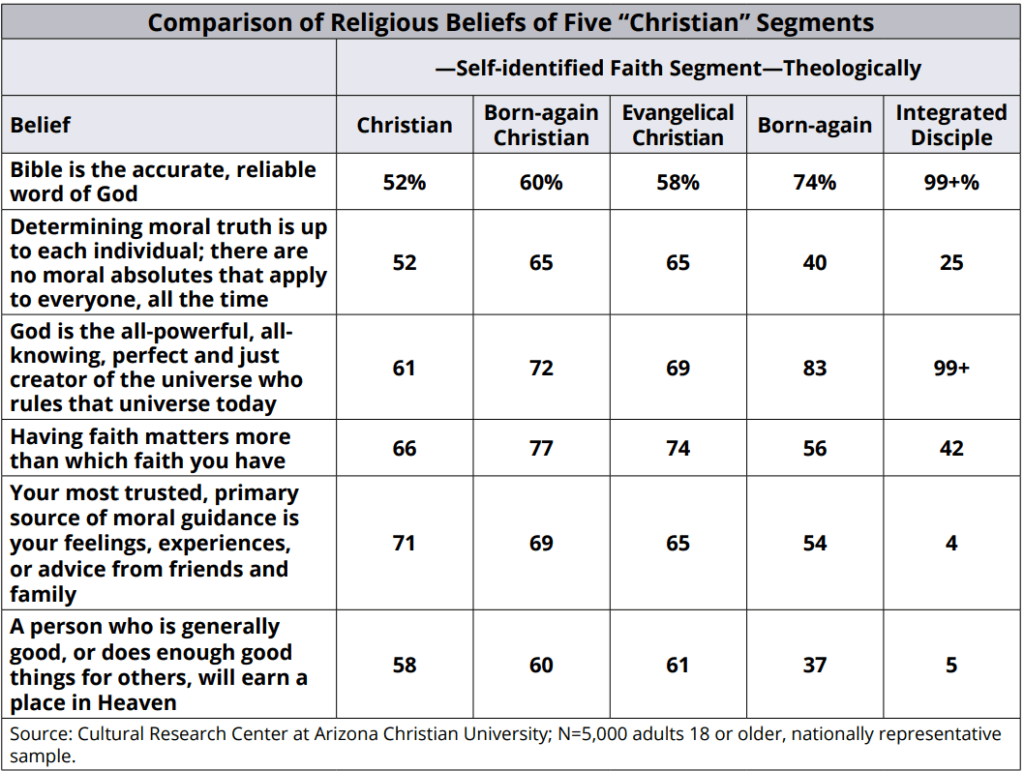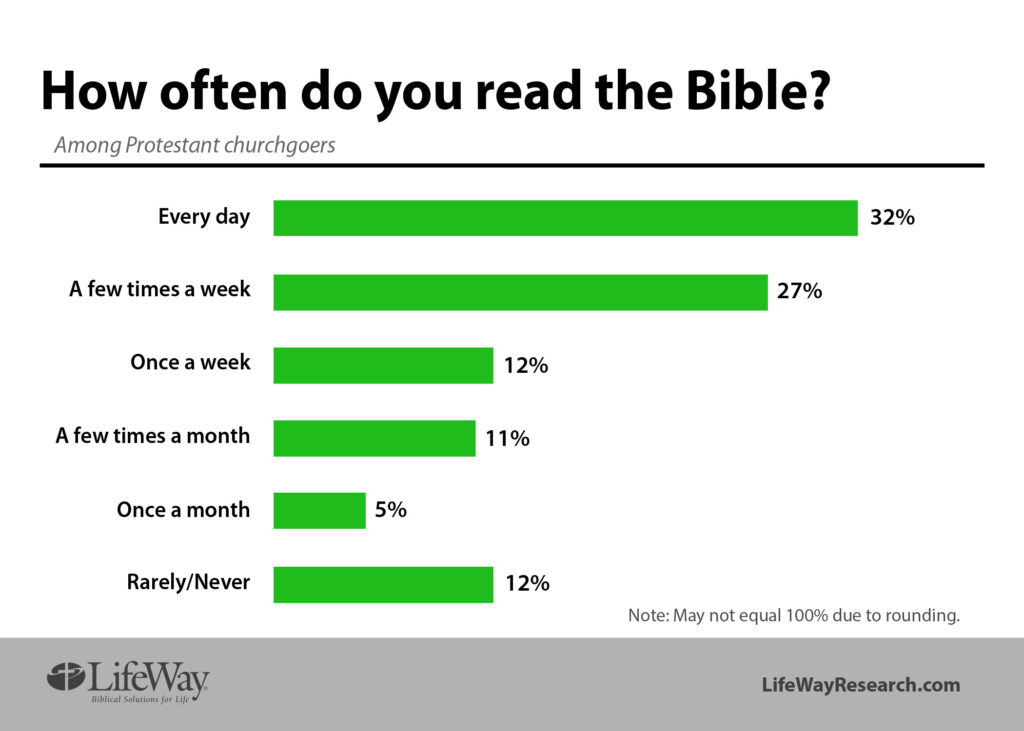What Do You Mean By ‘Christian’?
In 2023, it must be harder than ever for non-Christians to know what people mean when they say they are Christians. On the one hand, you have the Roman Catholic Church – with its ornate cathedrals, robed clergy, choral music, and vast resources. On the other end of the spectrum, you have the American Evangelical churches – usually autonomous in leadership organization, whose sanctuaries are completely devoid of artwork or imagery, whose music is more like a concert, and whose pastors can frequently be found wearing jeans and flip flops. In between those two, you’ve got people who handle snakes, pastors in $1000 suits frantically running across the stage, and people on street corners waging their fingers encouraging others to turn or burn. You’ve also got groups like the Ladder Day Saints (Mormons) and the Jehovah’s Witnesses who call themselves Christians. Ask people what comes to mind when they think about Mormons and they will tell you about men with many wives, they are led by The Prophet, and they wear holy underwear.
While the places of worship, the garb, and the music may be different in these various examples, what matters is what they believe. That is where the differences that matter can be found. As someone who devotes a major chuck of his time to studying theology, philosophy, and apologetics I pay attention to what other Christians say they believe. And, let me tell you, it’s all over the place.
What Does It Mean To Be A Christian?
Words have definitions. This may seem like an obvious statement, but it has been a recent trend over the past few decades to “deepen” or “broaden” the meaning of words so they can be applied to more people, situations, and things. At some point, the word becomes so broad that it lacks any meaning or distinction. This is certainly true of the word “Christian”. Terms need to have definitions for us to discuss them or for us to be able to use them.
The word Christian was first used in Antioch to describe the disciples of Jesus (Acts 11:26) sometime in the mid-first century. If we want to know what Christians believe, we need only to look at their sourcebook – the Bible. While the Bible has a lot to say about many things, certain things are central to being a Christian by definition. In my theology class, I start with the core doctrines of Christianity – that God exists, that God is triune in nature, that humanity is fallen and in need of a savior, that people cannot earn their way into Heaven, that Jesus rose from the dead, that Jesus is both fully God and fully Man, and that the Bible is God’s Word given directly to us from Him through human authors. That’s not a definitive list, but you get the idea. Now, you may disagree with some of those doctrines. That’s fine. I could be wrong. All I’m saying is that if you disagree with those then you’re not Christian; you’re something else.
Belief vs Salvation
I want to be very careful and make a distinction between what Christians should believe and what they need to do to be saved. The requirement for salvation is pretty simple. Paul gives it to us in Romans 10:9 when he writes, “because, if you confess with your mouth that Jesus is Lord and believe in your heart that God raised him from the dead, you will be saved”. Many Christians – especially new ones – may lack belief in some things in the list I gave earlier. And, a lot of that may be because they have never learned those tenets or thought about them. I also don’t want to make salvation tied to your level of knowledge because that would mean people who get doctorates in theology and Biblical studies are better Christians than those who lack knowledge. And, that just isn’t the case.
Nobody epitomized this sentiment more than my mom. I’ve discussed the way she led her life in a previous article. Let’s just say that if ever there was a person who exemplified how one ought to live their life as a Christian, it was my Mom. But, for all of her 80 years of going to church, she couldn’t tell you what “inerrant” meant. And, she might have even thought that “good people” get into Heaven (of course, she defined “good people” as people who did what Jesus said). She wasn’t theologically deep. But, she certainly professed Jesus as Lord over her life and it was obvious that she believed it by the way she lived her life.
So, I want to be very careful to say that you do not have to have a fully developed theology to be saved. Paul says it. If you make Jesus the Lord of your life (which also means you do your best to follow Jesus and what he taught), and if you profess that he rose from the dead, you will have a place with Him in the Kingdom.
What Do Christians Actually Believe?
I felt that I needed to make the distinction in the previous section because, frankly, the theological state of Christendom is a disaster. I have had this sense for several years just through interaction with other Christians. Recently, I came across a few surveys that confirmed what I had been seeing. These should be a bit of a wake-up call for Christians – especially those who preach, teach, or lead in their churches and families. Both of these surveys highlight what Christians believe today. Seeing the results is a bit disheartening. And, it can make one feel like the church in America is past the point of no return.
Arizona Christian University conducts yearly surveys to see the state of various world views in the US. In 2021 they released some of their results in a report titled “What Does it Mean When People Say They Are ‘Christian'”? It may seem like a strange question to dedicate a report to, but I get it. I’ve heard some people say some pretty goofy things who say they are Christian. It should excite me when I hear someone call themselves a Christian. These days, though, I feel like I have to ask “What do you mean by ‘Christian'” before I get too excited. And you’ll see why momentarily.
Christianity has many different viewpoints on many topics. There are different perspectives on things like baptism, church leadership, creation, Hell, and when Jesus is coming back. But, these surveys don’t ask those questions. These surveys ask about the core ideas; the ones I listed earlier.
In the 2021 survey from ACU, 69% percent of adults in the US self-identified as Christian. That means there was a question on the survey that said something like “check the box next to your belief system” and they checked “Christian”.
On the other end of the spectrum are what the survey calls “Integrated Disciples”. This group “demonstrated [the] ability to assimilate their beliefs into their lifestyle”. In other words, based on how they answered several theological questions in the survey, they live out the Biblical worldview. This group is a meager 6%. Only 6% of people who consider themselves Christians are living out a worldview that is consistent with what the Bible teaches.
There are three other groups in the survey as well – self-identified born-again (35%), self-identified evangelicals (28&), and theologically born-again (28%). Each of these groups has varying percentages of members who are living out a consistent Biblical worldview.
The Results Are In
Let’s go over some of the questions on the survey to get an idea of what these various groups of Christians believe. The survey asked if the Bible was the accurate, reliable word of God. It asked if determining moral truth was up to the individual and if there are moral absolutes. It asked if the trusted, primary sources of moral guidance should be your feelings, experiences, or advice from friends and family. And it asked if people who are good enough will earn their place in Heaven. Remember, the Bible teaches that God is the moral standard from which we should draw our morality, that He created the universe, that He’s in charge, that the only way to get to Heaven is through Jesus, and no amount of good you do can measure up to the standard required to get in on your works. Now, let’s have a look at the responses.

Notice these aren’t hot-button cultural topics like abortion, gay marriage, or transgender issues. These aren’t even questions around the typical issues churches split over – Creation, baptism, church governance, music, etc. These are core doctrinal issues. Barely half of the people who consider themselves Christian think that the book they get their beliefs from is reliable and accurate and cones from the being they proclaim they follow. And more than half of self-professing Christians think as long as someone is basically good and does good things, they will get into Heaven. This is the exact opposite of what the Gospel teaches.
Why is it that the vast majority of Christians got these questions wrong? Why is it that such a small percentage (6%) got them right? Here I want to look at another survey that I think sheds more light on what’s going on.
Every two years Ligonier Ministries and LifeWay Research conduct a survey of the U.S. Evangelical church to see where it stands on theological issues. The survey was given to members of Evangelical churches as well as people who were non-Christians. They were asked if people were basically born good, if they needed to join a local church, if the Bible was literally true, and if Jesus was just a great moral teacher. They also were asked about topics of homosexual marriage, if gender was a choice, and if abortion was a sin.
This survey showed similar results to the other survey. On the core issues regarding the Bible, who Jesus is, and where one should get one’s morals from, Evangelicals lined up with non-Christians. On the topic of people being born innocent 71% of non-Christians said they were and so did 65% of Evangelicals. When asked if they were obligated to join a church – 36% vs 68%. Only 2/3 of Evangelicals think they need to be a church member. When asked about the Bible not being literally true – 53% vs 26%. When asked if God accepts the worship of all religions 56% of evangelicals said that He does – despite Jesus’ clear teaching that He is the only way (John 14:6). And 43% of evangelicals think that Jesus was merely a wise teacher but he wasn’t God. Remember what we said a Christian was – someone who was a disciple of Jesus. Almost half of the people who say they are his followers don’t think he was God.
The survey also found that on certain cultural issues revolving around sexual ethics, evangelicals line up pretty close to the average U.S. citizen. When asked if the Bible’s condemnation of homosexual behavior should apply today 28% of Evangelicals said it didn’t apply anymore compared to 46 % of U.S. adults. When asked if gender identity was a choice 37% of Evangelicals said it was compared to 42% of U.S. adults. Now, when it comes to the topics of marriage and abortion, this is where evangelicals can be seen distancing themselves from the rest of the U.S. When asked if sex outside of traditional marriage was a sin 94% of evangelicals said it was. And on abortion, 91% said it was a sin.
People Of The Book
One thing that most non-Christians know about Christians is that they are supposed to get their instructions from a book. The Bible is the most popular book ever printed. It’s estimated that over 100 million copies are bought or given away every year. It’s been translated into 349 languages, and the Bible Society estimates that 2.5 billion copies were printed between 1815 and 1975. Hard to say how many were printed before that. Today, a huge chunk of people read on their phones. YouVersion (the most popular Bible app for mobile devices) has been downloaded over 100 million times onto Android devices. Apple doesn’t give you the number of downloads for their apps, but YouVersion has been rated 9.6 million times. There are also a dozen other Bible apps in both marketplaces – all of which have been downloaded about a million times each and have tons of ratings.
Looking at these numbers is pretty encouraging. Millions of people in the US alone have Bibles – digital, physical, or both. But have a look at this survey from LifeWay that shows how frequently Protestants read their Bibles. This survey was done in 2019 of Protestants and non-denominational churchgoers who said they attended religious services at least once a month.

So, despite being known for the book we follow, 40% of regular churchgoers read that book once a week or less. 12% rarely do. In short, lots of people are buying and downloading Bibles. But, they aren’t spending much time putting them to use.
Church Attendance
According to another Lifeway report on Church attendance, over one-third of Americans (34%) say they never attend religious services. And, slightly less than a third (32%) say they attend regularly. That leaves the other third in the sporadic attendance category (fewer times than once a month).
If we zoom in on the regular church attenders (those who go at least once a month), we can see that 13% attend monthly, 16% attend two to three times a month, 13% attend nearly every week, 41% attend weekly, and 5% attend more than once a week.
As for the less-than-regular attendees, 32% of them attend less than once a year, 38% attend once a year, and 29% attend several times per year. It’s hard to know exactly how many of these people would consider themselves Christian, but I would wager a great many of them do.
It’s difficult to know how the numbers on Bible study and church attendance overlap. But, based on the Bible study statistics, it’s safe to say that most people who consider themselves Christians get the majority of their education when they attend church services and listen to the pastor’s sermons. So, how long are these lessons? According to another survey from Lifeway, the average sermon falls in the 20-40 minute range. As a point of comparison picture yourself back in your high school days. How well would you have done in your English, History, or Chemistry classes if you only attended class a couple of times a month and never did the homework? Even if you were a “good” student and attended once a week – how well would you know the subject?
Now, I’m not advocating for us to be in church (“class”) every day and listening to sermons every day. I’m just pointing out how woefully inadequate a single lesson once a week (if we’re lucky) is for us to get a fundamental understanding of the Christian worldview. Is it any wonder most Christians don’t know what Christianity teaches?
Christian Confusion
What becomes evident in these surveys – and through interactions with regular Christians – is that what Christians believe is all over the place. From an outside observer looking in, it would be impossible, I think, to try and figure out what Christians believe just by talking to Christians. In the intro to Mere Christianity, C.S. Lewis uses a great illustration of core doctrine that unites all organizations that would consider themselves Christian. He says that the Church (meaning all of the combined denominations) is like the wing of a house with many rooms. Each one of the rooms represents a different denomination. But, they are all connected by the same hallway. This hallway (what he calls “mere Christianity”) is what we can all agree on. To take the analogy a little further, today we have a lot of people who are sleepwalking around the house – some are in the kitchen, some are in the cellar, some have left the house altogether – but they think they are still in their room.
The Church has a big problem. Its members don’t know what the worldview they claim to be part of actually teaches. Those who don’t know what their worldview teaches can’t possibly live it out. And they certainly can’t accurately explain it to others even though they are commanded to (remember the whole “go forth and make disciples of all nations” thing in Matt 28:19?).
Despite the somber and depressing tone of this article, there are ways out of the hole we are in. Before I propose a solution, though, it will help to understand why we are in this predicament in the first place. How did we get here? That’s the question we will attempt to answer next time.
Share This Story, Choose Your Platform!
latest video
news via inbox
Nulla turp dis cursus. Integer liberos euismod pretium faucibua








It is interesting to see that it is not necessary to have a fully developed theology to be saved. Of course we’re supposed to grow our knowledge but there is no amount of knowledge that can save us unless we accept Jesus as our savior
Hi Mia,
That’s right! Our knowledge isn’t what saves us. But, we should want to know more about God because we are excited about the things He does in our lives.
this article helped me better understand that being a Christian is a term that’s confusing to some because some believers misuse the term and it’s become so broad over time.
Hi Isabella,
Glad it helped you!